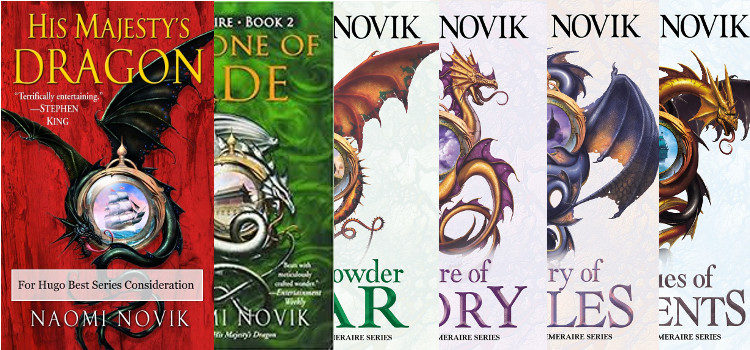- His Majesty’s Dragon (2006)
- Throne of Jade (2006)
- Black Powder War (2006)
- Empire of Ivory (2007)
- Victory of Eagles (2008)
- Tongues of Serpents (2010)
Master and Commander and Dragons that expands it’s ambitions as the series continues.
The first book is in this series is pretty close to the platonic ideal of Napoleonic ships and Dragons.1 As the series continues however, Novik sets her sights on bigger things, and does something laudable that many fantasy authors never do – thinks through the consequences of her premise. Over the course of the next five novels, she examines the extension of the franchise, slavery, colonialism, mercantilism, and the conflict between honor and duty, through the prism of a world where power is shifted by the existence of Dragon’s weighing 10’s of tons.
All of this is carefully thought out, and the author exhibits an extremely strong grasp of the period. With native populations possessing dragons, colonialism is extremely limited through South America and Africa, and in later books a revolt against the western powers is possible in the early 19th century. With the introduction of China, a place where humans and dragons coexist, it’s impossible for the protagonist to not treat the talking, reasoning beasts as anything other than full participants in enlightenment society. Furthermore, the knock on effects to British foreign policy moderated through the East India company and the military and carefully considered.
Most interesting is the conflict in Laurence, Temeraire’s captain. He is the very model of 19th century British honour, and Novik is at great pains to point out that individual honour is in apposition to the self-interested behaviour of a European Great Power. This gives Novik a crowbar with which to pull apart the ‘civilising’ narrative of european history, both internally and externally. Unfortunately, to be honorable at the time is to have a duty to King and Country, and this forces the plot into knots to avoid Laurence having to face the full consequences of his actions when he chooses to do what is right.
The biggest knock against the later books however is that they are, through the middle sections at least, boring. Book two fells like it spends most of its narrative on the trip to China, book three on the return journey, book four a travelogue of Africa, and book six a range through the Australian outback. Only the first and fifth book maintain a constant narrative pace, and both are excellent. What kept me reading,2 was the illusion of forward momentum generated by the events at the end of each book and the incredibly well realised world. After a one in three strike rate in six books however, I gave up. Also, the later books introduce us to Temeraire’s perspective, and this was a mistake, as his narration does not add much beyond Laurence’s point of view.
A great first book and a desire to grapple with real issues is let down somewhat by spending too much time on the journey.
- See my earlier review.
- Apart from a trip to Oz!
